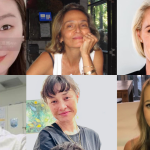
PEDESTRIAN TV has partnered with La Trobe University to explore some of the big issues their researchers are looking at right now. Head over HERE to learn how La Trobe are working to solve some of the biggest issues of our time.
You might have noticed that the world isn’t in particularly great shape right now. We’re dealing with one of the biggest refugee crises in history, driven by a devastating civil war in Syria. So, it’s worth asking why we haven’t worked out a way to create and maintain peace in areas like the Middle East, which have been mired in war and civil conflict.
After civil war, many of the standard peace processes don’t seem to do much. Blokes in suits signing a peace treaty thousands of kilometres away don’t do much for the people still living in warzones.
Researchers at La Trobe University are investigating exactly why peace processes like this fail. They want to find out how people are affected by war on a human level, and use this information to influence policymakers to take real action to address those problems on the ground.
Dr Jasmine-Kim Westerndorf, Lecturer in International Relations in the Department of Politics and Philosophy at La Trobe, is investigating why instability returns pretty quickly in countries after civil wars, often within 10 to 15 years, and why the lives of many regular people are still defined by violence and mistrust.
“Civil wars are enormously complex, especially when they have been going on for a long time,” says Westendorf. “It’s really difficult to bring them to an end and establish the sorts of institutional systems that you might expect in a peaceful state.”
Imagine somewhere absolutely obliterated by war, and torn to shreds by warring factions. Even if the war finishes, and the tension is over, a return to what we’d consider a ‘normal’ life isn’t an easy road. It’s not as simple as people just going about their normal lives as you might in a peaceful country – there’s just nothing to support that.
For example: imagine Australia running as it does every day, except without a parliament, or a health system, or a judicial system, or basic infrastructure. It’s basically inconceivable this could happen in Australia – however these are the issues warn torn countries face time and time again post-conflict.
Now, imagine that these kind of institutions do exist. Like in Syria, for example, which had a very successful healthcare system prior to its continuing civil war. Even if so called ‘peace’ has been achieved and systems restored, it’s hard to reintegrate soldiers and combatants into a society where they must once again contribute like everybody else.
“It’s hard to get formally warring groups to participate together in governance structures,” says Westendorf. Not only are there tensions that often aren’t ironed out, even though the war has formally finished, soldiers and combatants often aren’t huge fans of not being at the top of the heap.
“They may feel emasculated because they no longer have that power in society and don’t know what to do with themselves.”
So given these problems, what’s the solution?
La Trobe researchers are working on new solutions that throw out the old, technocratic ways of thinking about peace processes – they think we need to start thinking more about people. Maintaining peace is less about getting government right, and more about what ‘peace’ means to people living in the former warzone.
Not everyone sees peace the same way. Whether it’s soldiers who may feel emasculated, or citizens who might find themselves in a less stable situation after the war ends, everyone will have a different take on what peace actually should look like.
Working with people and finding out what peace means to them – helping them to build it themselves – offers a reliable way forward.
Learn more about why instability often returns after civil war and how La Trobe is working on solutions that offer a reliable way forward HERE.
Photo: Jordan Pix / Getty.







